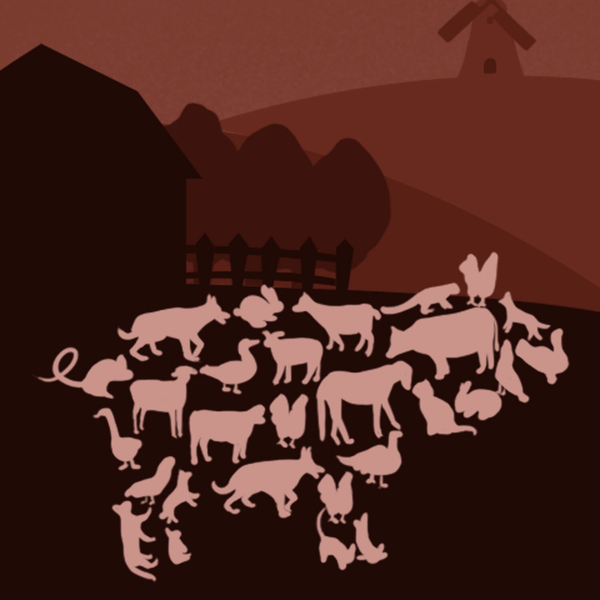
Rebellion on Animal Farm: A Tale of Power and Corruption
- 11:04
- August 15th 2023
Chapter 1:What is the book Animal Farm about
"Animal Farm" is a novella written by George Orwell. Published in 1945, it is an allegorical tale that serves as a critique of the Russian Revolution and the Soviet Union under Joseph Stalin.
The story takes place on Manor Farm, where the animals are led to rebel against their human farmer, Mr. Jones, who represents Tsar Nicholas II. The animals establish their own democratic society based on the principles of Animalism, with the most intelligent and persuasive pig, Old Major (representing Karl Marx or Vladimir Lenin), inspiring the revolution before his death.
After successfully driving away Mr. Jones, the animals take control of the farm and rename it Animal Farm. They establish Seven Commandments to ensure equality and fairness among all creatures. The two main pigs, Napoleon and Snowball, emerge as leaders, representing Stalin and Leon Trotsky respectively.
However, as time passes, Napoleon gradually consolidates power and becomes a totalitarian leader, just as Stalin did in the USSR. Through propaganda, deception, and manipulation, the pigs exploit the other animals for their own benefit, betraying the original ideals of Animalism. The Commandments are altered, and the principles of equality and justice are gradually eroded.
The book illustrates how power corrupts those who possess it and highlights the dangers of authoritarianism and totalitarianism. It explores themes of oppression, class struggle, and the abuse of language and propaganda to control the masses.
Chapter 2:Why was Animal Farm a controversial book
Criticism of Communism: Animal Farm criticizes communism and totalitarianism, challenging the notion of equality and exposing the inherent flaws and dangers within such systems. This critique challenged the prevailing narrative of the time and drew criticism from those who believed in the communist ideology.
Censorship: Due to its critique of communism and its allegorical portrayal of Soviet leaders, Animal Farm faced censorship and was banned in some countries during the Cold War period. Governments and institutions that aligned with or sympathized with the Soviet Union sought to suppress the book's message and prevent its dissemination.
Influence on Political Discourse: Animal Farm has been widely interpreted as a critique not only of the Soviet Union but also of other authoritarian regimes and power structures. The book's enduring popularity and relevance have contributed to its controversial nature, as it continues to challenge political ideologies and provoke discussions about power, corruption, and propaganda.
Chapter 3:What is the moral of the book Animal Farm
The book "Animal Farm" by George Orwell presents several moral lessons. One of the key morals is the potential for corruption and abuse of power within political systems. The novel illustrates how idealistic principles can be twisted and betrayed by those in positions of authority, as the pigs gradually become oppressive rulers, mirroring human totalitarian regimes.
Another moral conveyed is the importance of remaining vigilant and questioning authority. The animals initially rebel against their human oppressors to establish a society based on equality and justice. However, their failure to maintain constant vigilance allows the pigs to manipulate and exploit their comrades.
Additionally, Animal Farm teaches us about the dangers of ignorance and manipulation of language. The pigs, led by Napoleon, use propaganda and deceit to control the other animals. They gradually alter the commandments of Animalism to suit their own interests, manipulating language to justify their actions.
Read Book Briefs Podcast
Welcome to the Read Book Briefs Podcast, where we explore the world of literature in bite-sized episodes. If you're an avid reader or just looking for some book recommendations, this podcast is for you.
Each episode, we'll dive into a different book and give you a brief summary of the plot, characters, and themes. We'll also discuss our thoughts and opinions on the book, including what we loved and what we didn't.
But that's not all - we'll also interview authors, publishers, and other experts in the literary world to get their insights and perspectives. Whether you're a fan of fiction, non-fiction, or anything in between, there's something for everyone on the Read Book Briefs Podcast.
So grab a cup of tea, curl up with a good book, and join us every week as we explore the wonderful world of literature.